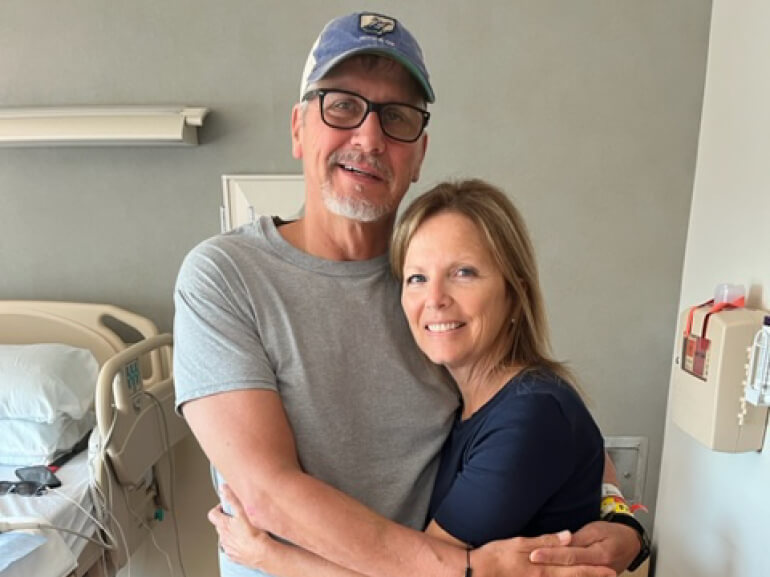Kevin's story

Clermont county native Kevin Bush has always been known as the “go-to” handyman, ready to lend his help or a truck when needed. Happily married to wife, Kim, for 27 years, the couple has two children and four grandchildren, all living nearby. In his free time, Kevin enjoys golfing, socializing, live music and going out to eat.
One day, Kevin was driving with his grandson in the car. It was his grandson who noticed something was off, saying, “What’s wrong with you grandpa? You’re falling asleep.”
Kevin recalled struggling to control his left hand and veering into the left lane where he side swiped another car. He pulled to the side of the road and an ambulance arrived. Recognizing the signs of stroke, the emergency services team rushed Kevin to Bethesda North.
In the emergency room, Kevin's world was a blur. The stroke had left him unable to move his left arm, walk or even use the bathroom without assistance. Once he was medically stable, his physicians recommended an intensive inpatient rehabilitation program to help him regain mobility and independence.
Based on his medical team’s recommendation, Kevin chose TriHealth Rehabilitation Hospital for his recovery. Kevin told his care team he wanted to walk, bathe and toilet independently.
Physical therapy activities aimed to strengthen his body and increase his endurance and activity tolerance. With the help of specialized equipment, including the exoskeleton—a wearable robotic device that supports and helps a patient as they relearn to walk, a treadmill, and an ankle brace, Kevin made remarkable progress. Four weeks later, he left the hospital on his feet, able to walk short distances independently with close supervision and up to 150 feet with a rolling walker.
In occupational therapy, Kevin worked on his left-sided weakness, transfers from sitting to standing. His therapists focused on refining his fine motor skills and activities of daily living such as bathing, dressing, grooming and toileting. Kim and his daughter also participated in family training. Together, they learned how to prepare the home for his return and provide him with the support he needed. At discharge, he could bathe and toilet independently, meeting his goal.
With the help from his speech therapists, Kevin made steady progress, working through deficits in attention, working memory, problem solving, visual scanning and reasoning. While Kevin admitted he “has a hard time being wrong,” he was grateful how the entire staff treated him with dignity and respect, and created a positive environment for recovery.
From feeling empty to being full of hope, Kevin credited his "big three" primary physical, occupational and speech therapists for helping him regain his independence. Indeed, throughout his rehab journey, Kevin discovered a new sense of connection with his therapists and fellow patients.
After four weeks in inpatient rehabilitation, Kevin looked forward to returning home, reuniting with his beloved dogs and watching TV. He planned to continue his rehabilitation journey with home therapy, with hopes of eventually transitioning to outpatient care.
Kevin's advice to others facing similar challenges is to stay positive, believe in therapy and embrace the support of dedicated therapists.
As he put it, "This is a great place to learn yourself all over again."